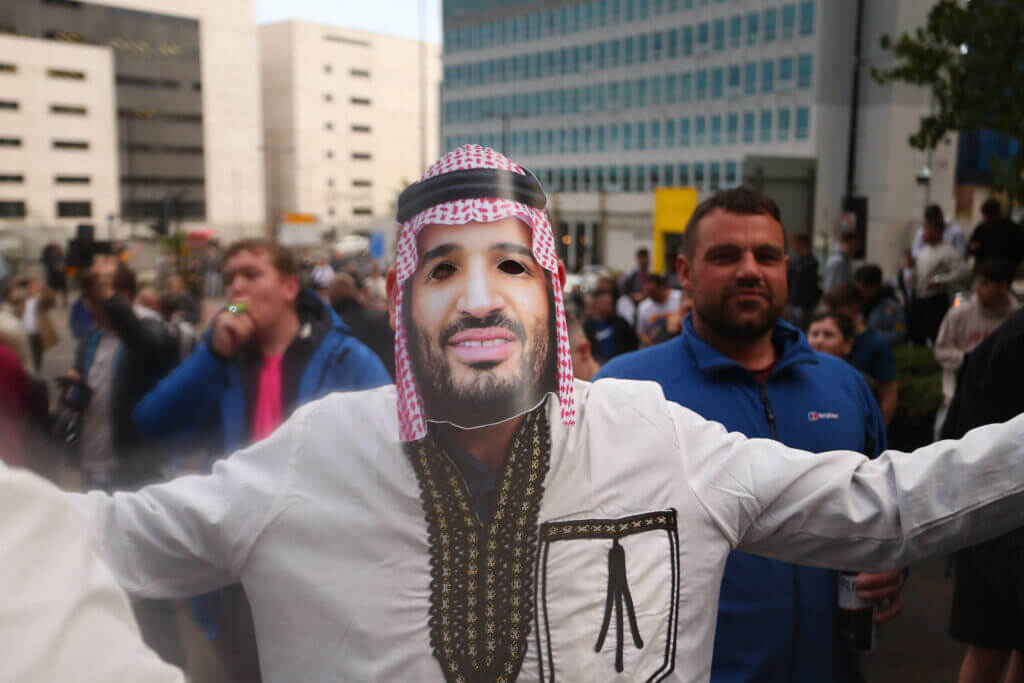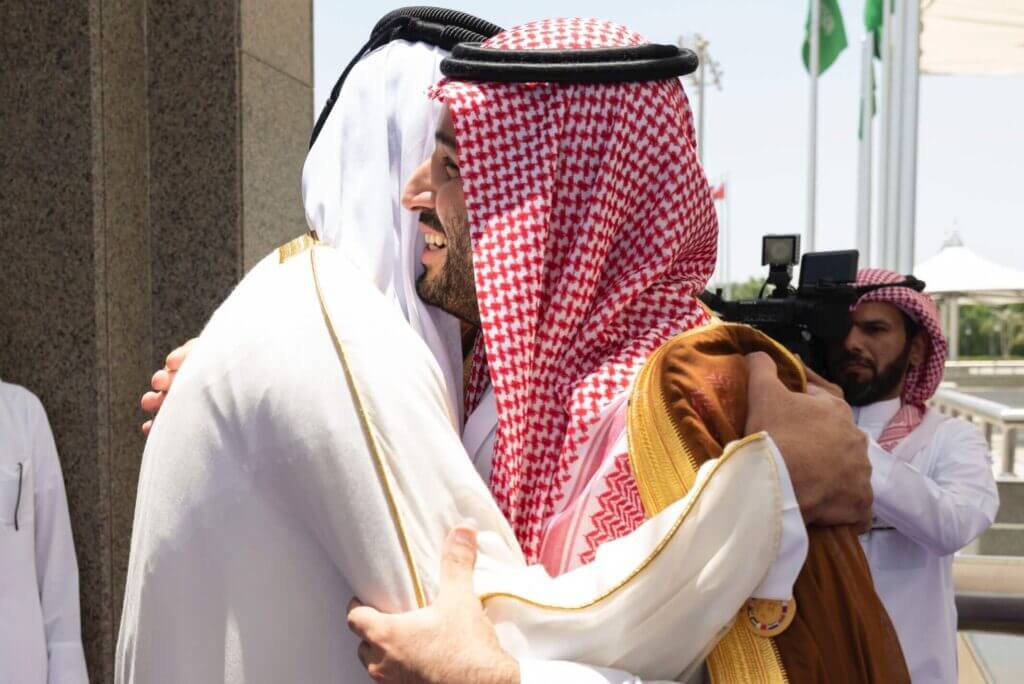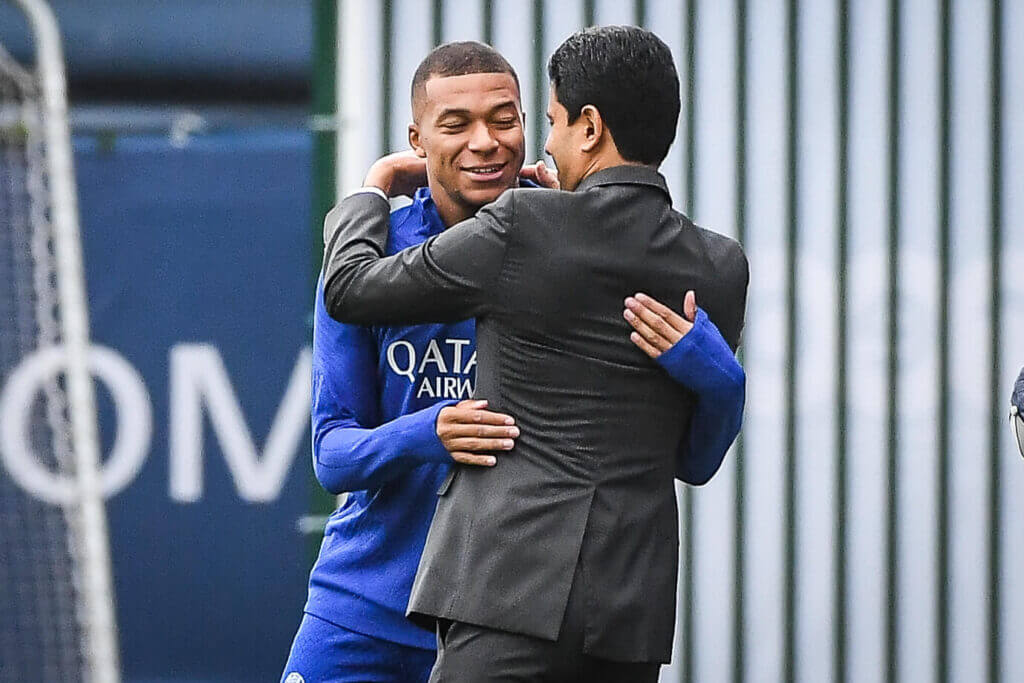“The Sultan of #Oman Haitham bin Tarik and #SaudiaArabia’s Crown Prince Mohammed bin Salman watched #Italy beat #England in the #Euro2020 final on Sunday,” Arab News tweeted to its 450,000 followers on the morning after the game.
The Saudi-based news organisation — “the Middle East’s leading English daily” — could never put it like this but the subtext was clear: “Look how normal we are! Just a couple of chaps on the sofa, with nibbles, watching the big match, on my big TV, in my big palace.”
Advertisement
As normal as normal can be.
And if you zoom in on the picture, you can just make out a familiar logo in the top right-hand corner of the TV. It is the same logo that more than 64 million football fans across the Middle East and North Africa had on their screens when they watched the match. It is the logo of beIN Sports, the Qatar-based broadcaster that owns the exclusive rights to most premium sports content across this part of the world and several other territories.
The Sultan of #Oman Haitham bin Tarik and #SaudiArabia’s Crown Prince Mohammed bin Salman watched #Italy beat #England in the #Euro2020 final on Sunday pic.twitter.com/Qlh7g7J9bX
— Arab News (@arabnews) July 12, 2021
Like we said, normal, right?
Now, 15 months after that glimpse into his life, it seems Mohammed bin Salman, commonly referred to as MBS, wants to buy beIN, or at least a bit of it, because it is how most people in his country, and many others, watch the best sport. And also because he can afford it.
Business as normal, then.
Erm, hold on… this is a bit awkward. We’re sure this is just a terrible mix-up (perhaps the TV was broken?) but you appear to have been breaking the law. Your law, your royal highness.
Because in July 2021, beIN Sports was still banned in Saudi Arabia, as it had been since June 2017. That was when MBS ganged up with his counterparts in Bahrain, Egypt and the United Arab Emirates to start a diplomatic and economic blockade of Qatar.
The small but rich state had annoyed its neighbours by maintaining relations with Iran and other regional bogeymen, letting the state-backed broadcaster Al Jazeera air the Gulf’s dirty linen and having the temerity to bid for and win the right to stage a World Cup.
So the coalition cut all diplomatic, economic, military and social ties with Qatar. The Saudis closed the peninsula’s only land border and the rest of them denied Qatar access to air space and national waters.
Advertisement
But Saudi Arabia, the Gulf’s biggest market, went further. It started a multi-front campaign to trash Qatar’s economy.
Within weeks of the blockade starting, beIN had lost its right to operate in the kingdom, its offices were closed and its assets confiscated. But that was just the start, because then somebody in Riyadh, with access to Arabsat’s satellites and a whole lot of other kit, started stealing beIN’s signal and pumping it out under a new name, beoutQ. Do you see what they did there?
BeoutQ soon became the world’s most brazen digital piracy operation, and that attracted the ire of all the sports bodies who liked beIN’s money and appreciated the high-quality offering the Doha-based firm had been providing to its subscribers since its launch in 2012.
The Premier League, for example, got very upset on beIN’s behalf and tried nine times to take legal action against whoever was behind beoutQ, only for whichever Saudi law firm it was obliged to use to decide against it at the last moment. The British government was also asked to have quiet words, which it did, to no obvious avail.
As 2017 became 2018, then 2019 and then 2020, this bizarre situation had become as normal as a couple of fans watching a match.
Saudi Arabia’s reputation for protecting intellectual property was in the mud, beIN was shedding staff and handing back rights it could no longer justify, and rights-holders around the world remained furious. But many Saudis were still streaming the real thing, as they didn’t want to watch beoutQ’s stolen, wobbly and slightly delayed coverage. Just like MBS and the Sultan of Oman, then.
So far, so what, right? It’s a family squabble. None of our business.
But then, in early 2020, Saudi Arabia’s Public Investment Fund (PIF), its biggest sovereign wealth fund, tried to buy Newcastle United, a team that no Saudi could legally watch and a team that played in a league that had been asking the Saudi state to stop stealing its product for three years.
You will remember the rest: cans, post-Brexit trade, Amanda Staveley, no red flags, Richard Masters, the owners’ and directors’ test, MBS on the blower, it’s all off, Mike Ashley, arbitration, 18 months of anguish… boom, written assurances, the deal is done, cans, cans, cans.

That was what happened on the surface. Like earthquakes, volcanoes and other stuff we vaguely remember from geography, the real action was happening at a tectonic-plate level.
First, Qatar did not fold. In fact, it started to win a series of victories, most notably when the World Trade Organisation ruled that the Saudi government had facilitated, promoted and failed to prosecute beoutQ. Saudi Arabia was losing face.
Advertisement
So, in January 2021, the Emir of Qatar came to a Gulf Cooperation Council meeting in Saudi Arabia and the row was over as quickly as it started.
After nine months of haggling, beIN’s ban was lifted and, hey presto, PIF’s representatives could now take the Premier League’s test, safe in the knowledge that they, as related parties to the beoutQ heist, would no longer fail it, cans, cans, cans.
And we all lived happily ever after. The end.
Except there is more.
“BeIn Media Group is considering a number of strategic options,” said a beIN spokesperson on Friday, before declining to comment any further on the reports of PIF’s interest in the company.
Not: “No, don’t be ridiculous, they tried to kill our business.” Blimey, you’re a forgiving bunch.
“As the old saying goes,” says Simon Chadwick, a professor of sport and geopolitical economy at the SKEMA Business School in Paris, “it’s a thin line between love and hate.
“For those familiar with the WTO’s beIN piracy investigation, which dogged PIF’s attempts to acquire Newcastle United, this may come as a surprise. However, Qatar and Saudi Arabia are prone to falling out and then reconciling.
“Officials in Qatar are pondering what the country’s post-World Cup landscape should look like, and some are concerned about the scale, reach and influence of Qatar’s activities moving forward. They want to build alliances that will ensure the country’s continuing prominence.
“Both Qatar Sports Investments (the owners of Paris Saint-Germain) and beIN are part of this process, indeed internal transformations are taking place within both.
“Qatari strategy in business and geopolitics is prone towards hedging, which means configuring a way of maintaining healthy relationships with as many stakeholders as possible.”
And Chadwick is right. These moves started some time ago. In fact, the possibility of PIF buying a stake in beIN was first reported in the Arab media last month. But nobody noticed it in the west, so PIF had to mention it again.
Advertisement
“Shared ownership of beIN would help in solidifying relations between the two countries, while enabling Qatar to ally with an increasingly aggressive investor in sport,” continues Chadwick.
“Saudi Arabia would bring strategic intent and financial resources, as well as considerable clout across the Middle East and North Africa (MENA), and perhaps also in sensitive markets like Russia and China.
“For the Saudis, who have been grappling with the complexities of establishing a rival to beIN, this would be an opportunity to become a shareholder in an established, ambitious rival, solving several problems.”
Namely the embarrassment of failing to replace beIN as the region’s premium sports broadcaster with a Saudi alternative, which was very much the plan during the Newcastle United takeover saga. The lesson here would appear to be, if you can’t beat them, buy them.

But is this simply a case of what MBS wants, MBS gets? Or does beIN have other plans?
“What we see in the sports media rights industry is that beIN is discreetly divesting from the sector — discreetly but significantly,” explains Pierre Maes, an international sports media rights consultant and author.
“Having once accounted for a third of the global spend on sports rights, beIN has massively cut its investments in major markets like MENA, Turkey, France and the US.
“I link the start of this move with the spectacular statement of (beIN CEO) Yousef Al-Obaidly in 2019 when he said piracy was a major issue and beIN’s spending on rights would reflect the fact they are no longer exclusive. That’s precisely what they did. And he repeated it in late 2021.”
And while beIN has stopped spraying so much money around on sports rights, it has gradually started to pivot towards becoming an all-round entertainment brand — an Arab Disney, if you like.
Advertisement
The first step on this journey was made in 2016, when beIN bought the American film and TV distribution company Miramax. Three years later, it sold 49 per cent of the business to Paramount Pictures with the intention of creating new binge-worthy content from Miramax’s back catalogue.
BeIN is already the biggest sport and entertainment broadcaster/streamer in MENA and Turkey, and it has a presence in almost 20 other countries as a sports provider, but those running the business know there is considerable room to grow on the entertainment side.
And that is why many within beIN would prefer to partner with one of the US-based private equity firms they have also been talking to, and not their noisy neighbours.
“Links with the US would bring geopolitical stability to one of Qatar’s showcase assets, as well as providing access to the world’s most mature market for entertainment and broadcasting,” notes Chadwick.
Maes adds: “It has to be seen as beIN’s attempt to become a global player in the entertainment industry.”
OK, but that’s not very football, is it?
“But you also have to consider PSG,” says Maes, who just published a book about the financial crisis in French football caused by the collapse of Ligue 1’s TV deal with Spanish-based and Chinese-backed Mediapro in 2020.
“People in Qatar must today ask themselves why the hell they have invested in Ligue 1. The Premier League is the de facto European Super League and not being there is a problem for the bigger European clubs outside the UK.
“You can’t talk about a soft power benefit when we see the permanent mess around PSG — it makes the Qatari owners look ridiculous.”
As Chadwick put it, the debate on what Qatar wants to be after the World Cup has already started and its investment portfolio could look very different in a year.
Advertisement
For example, will beIN, whose chairman is Nasser Al-Khelaifi, the president of PSG, among other jobs, be so interested in owning La Liga rights in Asia, France and MENA after the Spanish league’s boss Javier Tebas has spent the last five years accusing PSG of cheating and Al-Khelaifi of endangering European football?

Earlier this week, La Liga gained a court order to freeze beIN’s assets in Europe, claiming the Qatari firm owed them more than £43.5million (€50m) in late payments. Perhaps Tebas still thought the Saudis were going to launch their own regional sports broadcaster. One to keep an eye on.
Dr Kristian Ulrichsen is a Middle East expert based at Rice University’s Baker Institute for Public Policy. He is also the author of Qatar and the Gulf Crisis, the definitive account of the Qatar-Saudi dispute.
“I can see the attraction of a closer US partnership for beIN if the focus now is on building up the entertainment side,” says Ulrichsen.
“But I can also see how an investment from PIF would bring its own benefits, not least because it would fit into the closer Saudi-Qatari political and commercial relationship that we’ve seen develop since the rift ended in 2021.
“It would certainly involve a degree of face-saving on all sides, given the intensity of the row over beoutQ and related developments, such as the allegations that Nasser al-Khelaifi’s phones were targeted by (Israeli-developed spyware) Pegasus for surveillance.
“Any final decision will likely be a combination of political and commercial considerations.”
So, we should not be shocked that a company bankrolled by one country’s sovereign wealth fund is considering a merger with the sovereign wealth fund of the country that spent more than three years trying to destroy it. Nothing personal, it’s just business and politics.
Advertisement
In the meantime, we shall just have to wait and see if Saudi Arabia really does find a side door into one of the Premier League’s best customers, the company that also holds the MENA rights for the 2022, 2026 and, most intriguingly, 2030 World Cups. The latter, of course, is one Saudi Arabia would like to host.
And what better way could there be to signal that all that nastiness between 2017 and early 2021 is well and truly behind Qatar and Saudi Arabia than seeing beIN’s logo plastered across the front of Newcastle United’s shirt?
I am only joking. I think.
(Top photo: Amiri Diwan of Qatar/Handout/Anadolu Agency via Getty Images)
